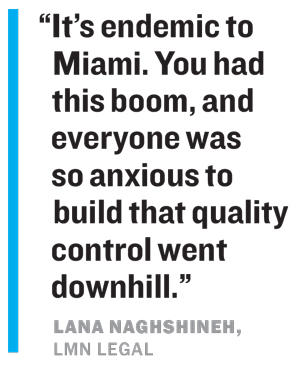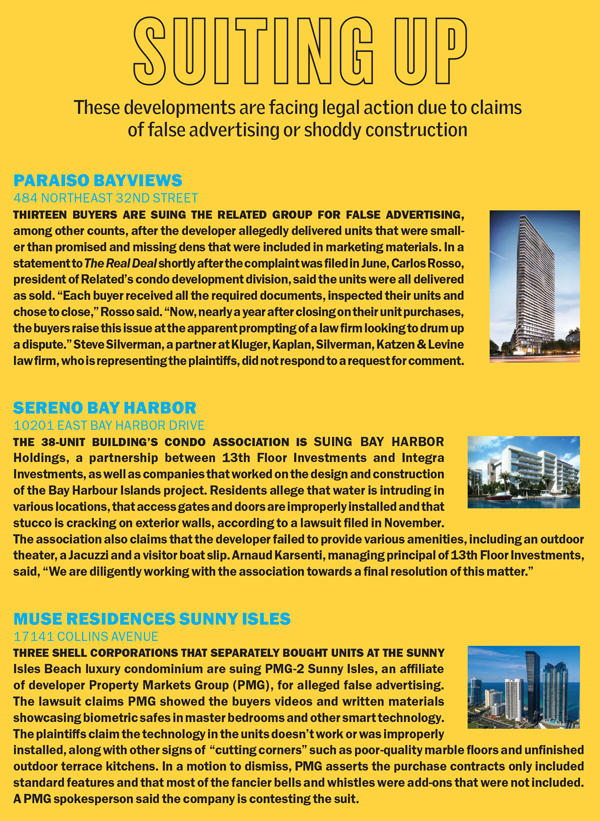The luxury South Beach condominium One Ocean is among the Related Group’s signature projects of the most recent cycle. Completed in 2016, the 50 units in the eight-story boutique building sold at an average of between $2.1 million and more than $5.1 million each, or from less than $1,030 to nearly $1,700 per square foot. Martin Franklin, executive chairman and co-founder of consumer products company Jarden, plunked down $6.4 million for a seventh-floor penthouse. Another tycoon, financier and Tampa Bay Rays part-owner Randy Frankel, purchased the penthouse next door to Franklin’s at the same price. Even Related’s chairman and CEO, Jorge Pérez, bought himself a top-floor unit at One Ocean, although at a considerable discount compared to his customers, given that he paid only $4.3 million. (He has since listed it for sale.)
Yet in the past year, One Ocean has been among three Related projects dogged by construction-defect claims brought against the Miami-based development firm and the companies it hired to work on buildings it recently completed. And it’s far from the only developer that’s been slapped with such suits of late. Lawsuits filed in the past 12 months detail how other luxury developers such as 13th Floor Investments, Integra Investments, Property Markets Group and JMH Development allegedly cut corners and misled real estate investors who bought seven-figure units in luxurious condo buildings that upon completion, according to the plaintiffs, showed poor workmanship or did not match marketing and sales materials.
“It’s endemic to Miami,” said construction attorney Lana Naghshineh. “You had this boom, and everyone was so anxious to build that quality control went downhill. All these high-net-worth individuals from countries were desperate to buy here, and when they got their units they had buyers’ remorse.”
 For Naghshineh and other lawyers who represent buyers, the blame lies with developers and construction companies under the gun to complete projects on schedule so that buyers don’t have a legal means to void a purchase contract. For lawyers representing the defendants, such as Brian Wolf of Smith, Currie & Hancock, the suits are practically a cottage industry for engineering consultants and attorneys who want to make money off suing developers and contractors.
For Naghshineh and other lawyers who represent buyers, the blame lies with developers and construction companies under the gun to complete projects on schedule so that buyers don’t have a legal means to void a purchase contract. For lawyers representing the defendants, such as Brian Wolf of Smith, Currie & Hancock, the suits are practically a cottage industry for engineering consultants and attorneys who want to make money off suing developers and contractors.
“They are approached by firms specializing in bringing condo-defect claims based on the fact that they know a newly formed [condo] board has a duty to investigate the new construction,” Wolf said. “Law firms and consulting companies will go through a building and identify as many items as they can and then initiate a process to generate a recovery for the association.”
Wolf estimated that he’s had to defend more than two dozen construction-defect lawsuits in the past year. Typically, these cases are settled before trial, with developers and contractors agreeing to pay six- to-seven-figure sums to the plaintiffs to cover the costs of repairs. And those settlements are typically paid by surety bond companies that insure projects, so his clients typically don’t pay out of pocket, he said.
Both sides agree that lawsuits alleging construction defects and false advertising are on the rise, as condo associations of buildings completed in the most recent cycle have to beat the clock on the state’s four-year statute of limitations on such legal action.
“If people find out their neighbors are having similar issues with a developer, these lawsuits will continue,” Naghshineh said. “Nearly every new condo is going to end up in litigation.”
She is currently representing the buyer of a four-bedroom unit at One Ocean who sued Related, general contractor Plaza Construction, architect Sieger Suarez and three subcontractors for allegedly failing to fix numerous defects involving defective showerheads, improperly installed light fixtures and shower doors, a nonworking spa pump and two parking spaces that are too small.
Related and Sieger Suarez declined comment, but a Plaza spokesperson said in a statement that the company had complied with its warranty requirements.
“To the extent that Plaza Construction has warranty obligations, we always endeavor to respond to such requests,” the spokesperson wrote via email. “In this instance, Plaza Construction timely and properly responded to the claims [made by Naghshineh’s client].”
 According to a Jan. 9 letter Plaza sent Naghshineh, the company inspected the unit after she provided a consultant’s report identifying 45 defects. Plaza agreed to fix some of the defects, but claimed most of the items were not part of the firm’s scope of work or had been done after the units were delivered.
According to a Jan. 9 letter Plaza sent Naghshineh, the company inspected the unit after she provided a consultant’s report identifying 45 defects. Plaza agreed to fix some of the defects, but claimed most of the items were not part of the firm’s scope of work or had been done after the units were delivered.
Meanwhile, Naghshineh’s client is stuck paying legal fees for her own lawsuit even as One Ocean’s condo association is also pursuing legal action against Related, Plaza, Sieger Suarez and the project’s subcontractors. In May, the condo association filed a separate complaint accusing the developer and its contractors of causing numerous deficiencies in the three-year-old building, including corrosion on sliding glass doors; cracked stucco walls, ceilings, balconies and masonry; and deteriorated and defective balcony railings.
“Imagine how frustrating that is,” Naghshineh said. “Things fall by the wayside in an effort to finish a building before the one next door is. In some cases, developers are competing with themselves. Related has a project two streets down from One Ocean.”
False advertising claims
It’s sometimes unfulfilled promises rather than shoddy work that’s the subject of such suits. In the case of 300 Collins, a five-story luxury project built by a partnership between JMH Development and Dhruv Piplani, the finished product is allegedly nothing like what the developers advertised. They’re being accused of providing finishes and materials inferior to what was advertised in sales and marketing materials.
In September, five individuals who purchased units at the boutique building sued the partnership, alleging that common elements such as electric garage doors, elevators, the pool deck and an ornamental fountain were improperly and cheaply installed, have been prone to malfunction or were never completed at all. The lawsuit claims that Piplani and JMH have ignored correcting serious or life-threatening issues such as “loss of air conditioning for multiple days in the heat of summer, malfunctioning elevators, lack of water and security concerns.”
Lawyers for the buyers and representatives of the developers did not return multiple requests for comment.
Jason Kellogg, a partner with the law firm Levine Kellogg Lehman Schneider + Grossman, said more and more developers are chalking up these kinds of lawsuits as a cost of doing business. “A developer has typically set aside some reserves for dealing with these issues,” Kellogg said. “It has become a routine process.”
Naghshineh, the lawyer representing the disgruntled One Ocean buyer, said developers typically don’t have to bear the cost of paying for defects and alterations in a condo project.
“It doesn’t hurt them, because their insurers pay the settlements,” she said. “That’s the problem here. If you are not hitting someone in their pocket, then where is the lesson?”
RELATED: Buyer at Muse sues to get deposits back, alleges he was misled on size of condos

